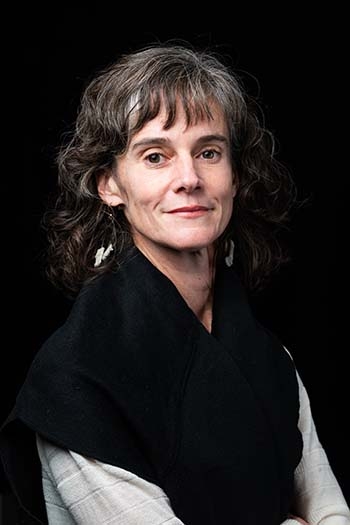By Amanda Brasier
In a new tradition, the flag bearer for the fall 2020 commencement for the College of Fine and Applied Arts is the college’s 2019-2020 Outstanding Teaching award recipient Dr. Rebecca Witter, assistant professor in Sustainable Development.
Witter was nominated by her students and colleagues for her excellence in teaching, with the award announced at the college’s welcome back ceremony in August. In addition to her teaching excellence award, Witter and Dr. Dana E. Powell from the Anthropology department received a 2019 Chancellor’s Innovation Scholar award that builds from existing strengths across the university, advancing research and teaching on environmental justice and climate action in North Carolina.
Collaborative is an excellent way to describe Witter’s approach to teaching and research.
“A lot of times when we talk about collaboration in academia, we are referring to collaborations between academics, which is fantastic, but I also love to be involved in teaching and research connecting students to people working for social justice and environmental protection outside of academia,” Witter said. “This helps students to ‘flip the script’ on who is the expert, who is defining problem and solution, to understand the landscape of theory in practice, and to begin to chart courses as change makers. In the environmental justice practicum, our students learn from members of frontline communities, those experiencing and responding to the harms unfolding in real time. They not only learn about these communities, they learn with and from them.”
The class with Powell isn’t the only collaborative, multi-disciplinary course that Witter teaches. She has also co-taught a “Sustainability and Creative Practice” course with Dr. Jim Toub, chair for the Department of Art. That class provides students a forum to examine creative practice as a fundamental dimension of a more expansive, more holistic, and perhaps even more effective model of sustainability.
“Teaching with another professor demands that we learn and grow as part of the planning and the teaching process,” Witter said.
Witter’s ongoing research is devoted to studying the interlinkages between conservation, rights, and culture in inclusive of a focus on the politics of illegal hunting of protected species in southern Africa. In one class, Conservation and Development, she allows students to explore the different viewpoints associated with hunting, from the perspective of the hunter or poacher, the tourist, the conservationist, the economist, the feminist and the government.
“It often surprises the students how much they come to care about hunting, and how many different meanings and values each of these groups attach to and derive from conservation,” Witter said. “It’s also helpful for students to see that well-meaning projects (like national parks) can have negative consequences (like dispossession). It’s really important for students to understand there can be hubris in good intentions. The last 100 years of development practice internationally has shown us that good intentions aren’t enough. Critical thinking matters, and it’s vital for informing, improving and transforming practice.”
As passionate as Witter is about the intersections of culture, power, environment and development, she gets incredibly excited when she shares the work and accomplishments of her students.
“What I really love about teaching and what really energizes me is connecting with students,” Witter said. “Being able to share knowledge and theory and a sense of belonging as we work through key sustainable development challenges together is incredibly rewarding and enriching. I think of teaching as a collaboration with students, and that’s definitely the spirit of how we practice teaching in my department. We make each other better, together.”

